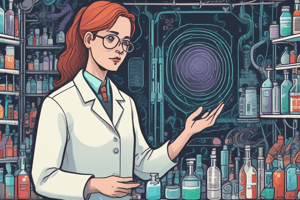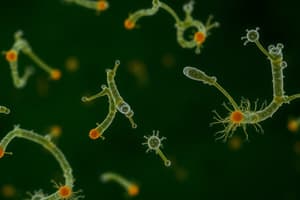Podcast
Questions and Answers
What does the term 'bios' in biology refer to?
What does the term 'bios' in biology refer to?
- The study of microbes
- The study of small organisms
- Living organisms (correct)
- The study of viruses
What percentage of microorganisms are disease-causing pathogens?
What percentage of microorganisms are disease-causing pathogens?
- 10%
- 50%
- 1%
- 3% (correct)
Who is credited with disproving spontaneous generation?
Who is credited with disproving spontaneous generation?
- Corynebacterium diphtheriae
- Dr. Adnan S.
- Antony Van Leeuwenhock
- Louis Pasteur (correct)
What is the term for the study of very small living organisms?
What is the term for the study of very small living organisms?
What is the term for the organisms that are present naturally in a particular environment?
What is the term for the organisms that are present naturally in a particular environment?
What is the theory that states diseases are transmitted by microbes?
What is the theory that states diseases are transmitted by microbes?
Who developed pure culture techniques?
Who developed pure culture techniques?
What is the term for the complete removal of all life forms, including endospores?
What is the term for the complete removal of all life forms, including endospores?
What is the main focus of Medical Microbiology?
What is the main focus of Medical Microbiology?
What are the experimental steps used to show that a specific organism causes a specific disease?
What are the experimental steps used to show that a specific organism causes a specific disease?
Who isolated bacteria as causative agents for Anthrax?
Who isolated bacteria as causative agents for Anthrax?
What is the focus of Environmental Microbiology?
What is the focus of Environmental Microbiology?
Flashcards are hidden until you start studying
Study Notes
Biology of Microbial Cell
- Biology refers to the study of living organisms, while microbiology studies very small microorganisms or microbes that require a microscope.
Microorganisms (MOs)
- Include bacteria, algae, protozoa, fungi, and viruses
- Viruses are infectious agents or particles
- 3% of microbes are pathogens (disease-causing), while 97% are non-pathogenic
- 87% of non-pathogens are beneficial and form indigenous microflora or microbiota
- Microorganisms are ubiquitous (found everywhere)
History of Microbiology
- Antony Van Leeuwenhock discovered "animalcules" (microorganisms) in 1676
- Spontaneous Generation theory believed living organisms arise from decomposing matter
- Contrasted with Biogenesis, which states life arises from pre-existing life
Contributions of Louis Pasteur
- Showed microbes cause fermentation and spoilage
- Disproved Spontaneous Generation
- Developed aseptic techniques (free from pathogenic microorganisms)
Germ Theory of Disease
- Diseases are transmitted by microbes from a diseased to a healthy person
- Examples: Diphtheria (Corynebacterium diphtheriae) and Tetanus (Clostridium tetani)
Contributions of Robert Koch
- Developed solid growth media
- Introduced pure culture techniques
- Developed simple stain technique
- Developed aseptic lab techniques
- Isolated bacteria as causative agents for Anthrax
Koch's Postulates
- Series of experimental steps to show a specific organism causes a specific disease
Spores and Sterilization
- Ferdinand Cohn discovered and described endospores
- Term "sterile" means complete removal of all life forms, including endospores
Branches of Microbiology
- Basic Microbiology: classifications, metabolism, nutrition, growth, and requirements
- Medical Microbiology: Human pathogens
- Industrial Microbiology: Microorganisms used to obtain industrial products
- Pharmaceutical Microbiology: Production of drugs, enzymes, solvents, and other products
- Agricultural Microbiology: Microorganisms as biofertilizers and biocontrol agents of plant pathogens
- Environmental Microbiology (Microbial Ecology): Microorganisms in pollution, biodegradation, and environmental processes
Studying That Suits You
Use AI to generate personalized quizzes and flashcards to suit your learning preferences.




